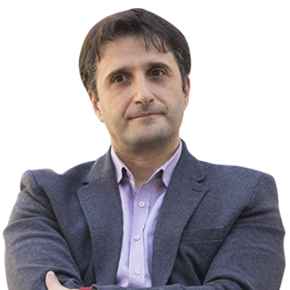Since the very beginning of this war, we have been discussing who our allies and friends are, how they can help us, why they do not help or do but not as much as we would like. It is wartime and emotions run high, that is clear. Nevertheless, let’s try to look at the matters in a sober, cold manner. We need to see reality as it is and have no illusory expectations.
The context
This is probably the most important point: we often fail to look at many layers that exist in international relations.
We want big countries to put aside their differences or disagreements to help us. That simply does not happen. I have already had the opportunity to write this: we must learn to look at problems through the eyes of other states. No country will subordinate its national interests to ours - especially the great powers.
All you see is not all there is
Unfortunately, many of our compatriots do not know this simple truth: a country’s policy and actions should not be judged on the basis of public speeches and press releases. There are always invisible layers, where real negotiations take place.
If X official of X country says something you do not like, it does not mean that the country has “betrayed” Armenia. Of course, in the age of Facebook and Twitter, public announcements sometimes come very close to real politics, but still not completely.
“Why doesn’t Russia help?”
First, we need to be clear about what kind of help we expect. The fact that we, after three weeks of intense war, have no shortage of weapons and armaments answers many questions and there is no need to tell all that goes on behind the scenes.
Let us recall how many times Ilham Aliyev and his subordinates publicly complained about Russian cargo planes flying to Armenia after the July battles in Tavush.
“Why isn’t Putin getting involved?”
First of all, he is. Putin’s effort laid the foundation for the October 10 trilateral agreements. It is another matter that Azerbaijan openly ignores them, which, I think, is already on the record.
To consider the issue more broadly, let me note that the settlement of the Nagorno-Karabakh conflict has never been among Vladimir Putin’s foreign policy priorities. We can assume the reasons for a long time, but there is no need for that today. The reality is that Putin has never been “personally involved” in the Karabakh peace talks. In general, the last leader to negotiate personally was French President Jacques Chirac. Dmitry Medvedev also made an attempt when he was President of Russia, but after Ilham Aliyev thwarted the meeting in Kazan in 2011, Medvedev’s interest clearly faded away.
“France will recognize Artsakh and all will be fine”
French President Emanuel Macron was perhaps the only leader to call a spade a spade after Turkey’s involvement in deployment of mercenaries since the early days of the war, hinting that Azerbaijan had started the war. Although Aliyev, who “demands accountability” from Macron, has been more cautious in recent days, it is clear that he will henceforth be very skeptical of France’s mediating role.
It’s great that at the 2018 summit of the leaders of the Francophone countries in Yerevan (which, by the way, was initiated by the previous Armenian government), Pashinyan and Macron established good personal relations, which definitely played a role in Macron’s position. However, this does not mean that Macron will hurry to recognize Artsakh’s independence.
I think France will keep discussing this issue but Paris is not going to be the one to make the final decision.
“The co-chairs are useless…”
Since 1997, OSCE Minsk Group co-chairmanship (Russia, USA and France) has been an exceptional format in international relations. Despite all the setbacks that occurred and still occur in the relations between Russia and the U.S., the U.S. and the EU and the EU and Russia, there is an undeniable fact - Moscow, Washington and Paris have always managed to maintain solidarity within the Minsk Group co-chairmanship. I do not believe that they have never had disagreements, but those have never been made public. George W. Bush’s National Security Adviser Condoleezza Rice has repeatedly stated that the OSCE Minsk Group has provided an “excellent opportunity” for the United States, Russia and France to work together.
Moreover, at different times, the OSCE Minsk Group co-chairmanship was in fact the only format, within which Russia and the United States had a real dialogue.
It seems to be working even now: Russian Security Council Secretary Nikolay Patrushev and U.S. President’s National Security Adviser Robert O’Brien met in Geneva on October 2. They both stated that Russia and the United States had similar approaches to the Karabakh conflict.
As you can see, the co-chairmanship of the OSCE Minsk Group is indeed a very important format, and Yerevan should hold on to it very tightly.
Between Turkey and the West
At the same time, we should take into account that Russia and Putin personally harbor a deep mistrust toward the United States and the West in general. Let’s not discuss the reasons for that either, it is just a factual truth that must be taken into account.
The clear proof of that mistrust showed itself in the October 14 interview of the Russian Foreign Minister. Giving a rather extensive answer to the question about Turkey’s role in the recent developments in the region, Sergey Lavrov added in the end: “Americans are no less active in the South Caucasus.”
That is the key. Russia is trying to choose the lesser evil and is considering these options: is it better to continue tactical alliance with Turkey, which allows for a more or less controllable situation in Syria, or should we cooperate with the West in one way or another and rebuke Erdogan? This is not an easy choice for Moscow, and we have to try to understand it.
I am more than convinced that Putin did not forgive Erdogan either for killing the Russian pilot or the murder of the Russian ambassador to Turkey. However, he has forged a tactical alliance with Erdogan to confront the West together. Remember the sale of Russian S-400 systems to Turkey, which strained the relations between Ankara and Washington as well as other NATO member states. By the way, Turkey has tested the S-400 for the first time on October 16.
Moscow might want to form a common stance on Karabakh with the European Union, but the EU has just imposed more sanctions on Russia, this time in relation to the “Navalny case”.
“President Macron must talk to President Putin if we want to establish a ceasefire. We are not going to stop it because of the sanctions in the Navalny case,” said Josep Borrell, the EU’s High Representative for Foreign Affairs and Security Policy. Nevertheless, it is clear that the new sanctions certainly do not increase mutual trust in Russia-EU relations.
However, I am getting an impression that Erdogan has indeed crossed a “red line” and Moscow is starting to react. On October 16, Russian periodical Kommersant published sensational details of Turkey’s participation in the Karabakh war. It is clear that such a detailed report could come from only one institution - the General Intelligence Department of the General Staff of the Russian Armed Forces. These reports aren’t published as you were. The message is very simple: “We see everything, so stop until it is too late.”
In conclusion
The situation is changing very quickly and there may be new developments in the coming days. What we must understand is that the Karabakh issue is a link in the chain of relations between the world powers and this conflict does not have a quick and easy solution. We must stand firm on all fronts despite great losses and hardships. Diplomacy has to work in parallel with the glorious Armenian army.
Ara Tadevosyan is Director of Mediamax






















Comments
Dear visitors, You can place your opinion on the material using your Facebook account. Please, be polite and follow our simple rules: you are not allowed to make off - topic comments, place advertisements, use abusive and filthy language. The editorial staff reserves the right to moderate and delete comments in case of breach of the rules.